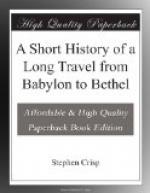“The Pilgrim’s Progress” is incomparably more exciting with raging beasts, Giant Despair, and Apollyon with all his hosts. The people Bunyan’s pilgrim meets are more vivid, portrayed with cruel detail and lusty humor. Theologically the Quaker tract is of a different age, not less exacting, but less pictorial. The medieval detail is gone but intense inwardness, devotion, and obedience are still required of the seeker to enable him to become a finder.
In his “Varieties of Religious Experience,” which I heard William James deliver as a series of lectures at Stanford University when I was a Freshman over sixty years ago, he said of the religion of the Quakers: In a day of shams it was a religion of veracity rooted in spiritual inwardness and a return to something more like the original gospel truth than men had ever known in England. He continued, so far as our Christian sects are evolving into liberality, they are simply reverting in essence to the position which Fox and the early Quakers so long ago assumed.
With this conclusion I heartily commend to sympathetic seekers today the brief allegory by Stephen Crisp: “A Short History of a Long Travel from Babylon to Bethel.”
Anna Cox Brinton
A SHORT HISTORY
In the days of my youth, when I lived at home in my father’s house, I heard many people talk of the house of God; and that whosoever did attain to get into it did enjoy all manner of happiness, both in this world and that which is to come. And a great desire kindled in me, if it were possible, to get into the house; yet I know not where it was, neither did they who talked of it; but they had heard the report, and they reported what they had heard. There were also some books, that had been written by men who had been in that house; which books did declare much of the joy and felicity they had in the house. These books I got, and read them over and over; which did much strengthen my belief in the truth of the reports: yet by no means could I tell which was my way. But so ardent were my desires, that I thought myself willing to forsake my father’s house, my country, and all, and travel anywhere, wherever my legs would carry me, so that I might find this house.




